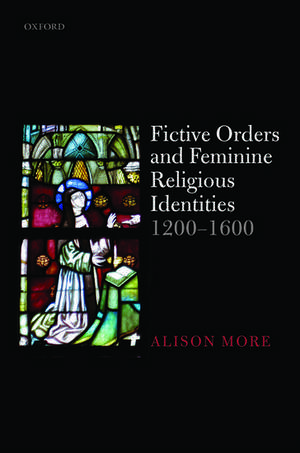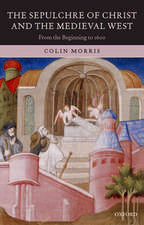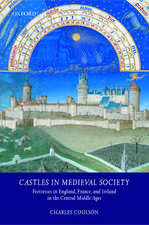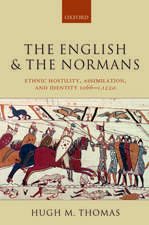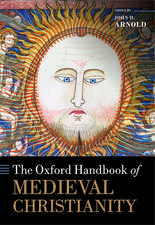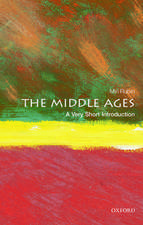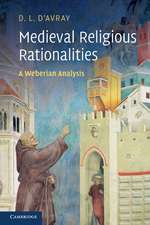Fictive Orders and Feminine Religious Identities, 1200-1600
Autor Alison Moreen Limba Engleză Hardback – 8 mar 2018
Preț: 545.21 lei
Preț vechi: 781.90 lei
-30% Nou
Puncte Express: 818
Preț estimativ în valută:
104.34€ • 108.79$ • 86.71£
104.34€ • 108.79$ • 86.71£
Carte tipărită la comandă
Livrare economică 10-17 martie
Preluare comenzi: 021 569.72.76
Specificații
ISBN-13: 9780198807698
ISBN-10: 0198807694
Pagini: 216
Dimensiuni: 164 x 242 x 25 mm
Greutate: 0.49 kg
Editura: OUP OXFORD
Colecția OUP Oxford
Locul publicării:Oxford, United Kingdom
ISBN-10: 0198807694
Pagini: 216
Dimensiuni: 164 x 242 x 25 mm
Greutate: 0.49 kg
Editura: OUP OXFORD
Colecția OUP Oxford
Locul publicării:Oxford, United Kingdom
Recenzii
...the book's central thesis is of compelling interest.
...deeply researched book...
Fictive Orders and Feminine Religious Identities offers a much-welcome analysis of the representation of women religious in the late medieval period. More brings a valuable contribution to the vibrant scholarship on active womenreligious in late medieval and early modern Europe.
More's book is an important contribution to the history of medieval women's religious communities that brings together a wealth of new scholarship on lay female piety...Dispelling the myth of order unity and probing the thorny problem of nomenclature, More reminds us that medieval women's lives were much more active and dynamic than labels, claimed affiliations, rules and narratives suggest.
In demonstrating so convincingly that identity and vocation is irreducible to order affiliation and the ways in which processes of regularisation were used by male ecclesiasts to suppress the provocative imaginative worlds of extra-regular women, More has written one of the most important books on medieval women's religious devotion in the field. I hope that it pushes historians of these women who are not already doing so to rethink radically how we write their histories, and to refuse to replicate narratives that participate in their silencing.
The book is...a valuable reminder to historians to think about whose lenses we employ when looking at the past, and whose metrics we use when we consider issues of identity and importance...Fictive Orders is on the whole a welcome contribution to the field. It will be particularly useful to scholars of medieval women's religious history, for its careful reading and contextualisation of a multiplicity of sources, and for its insistence in dealing with women on their own terms. However, it will also be appreciated by a more general audience of scholars, who are interested in the complex ways in which identities are created by, negotiated, and indeed imposed on, women.
[Fictive Orders] will be useful to scholars interested in medieval religious women, gendered identities and historiography. The study is well supplied with the most updated literature in the field which makes it an excellent bibliographical resource for the non-specialist interested in the history of medieval lay women and religion.
...deeply researched book...
Fictive Orders and Feminine Religious Identities offers a much-welcome analysis of the representation of women religious in the late medieval period. More brings a valuable contribution to the vibrant scholarship on active womenreligious in late medieval and early modern Europe.
More's book is an important contribution to the history of medieval women's religious communities that brings together a wealth of new scholarship on lay female piety...Dispelling the myth of order unity and probing the thorny problem of nomenclature, More reminds us that medieval women's lives were much more active and dynamic than labels, claimed affiliations, rules and narratives suggest.
In demonstrating so convincingly that identity and vocation is irreducible to order affiliation and the ways in which processes of regularisation were used by male ecclesiasts to suppress the provocative imaginative worlds of extra-regular women, More has written one of the most important books on medieval women's religious devotion in the field. I hope that it pushes historians of these women who are not already doing so to rethink radically how we write their histories, and to refuse to replicate narratives that participate in their silencing.
The book is...a valuable reminder to historians to think about whose lenses we employ when looking at the past, and whose metrics we use when we consider issues of identity and importance...Fictive Orders is on the whole a welcome contribution to the field. It will be particularly useful to scholars of medieval women's religious history, for its careful reading and contextualisation of a multiplicity of sources, and for its insistence in dealing with women on their own terms. However, it will also be appreciated by a more general audience of scholars, who are interested in the complex ways in which identities are created by, negotiated, and indeed imposed on, women.
[Fictive Orders] will be useful to scholars interested in medieval religious women, gendered identities and historiography. The study is well supplied with the most updated literature in the field which makes it an excellent bibliographical resource for the non-specialist interested in the history of medieval lay women and religion.
Notă biografică
Alison More (PhD, University of Bristol, 2005) is Assistant Professor of Medieval Studies at the University of St. Michael's College in the University of Toronto. Her research interests include the changing devotional climate of the later middle ages, with a particular focus on the new religious movements that developed at this time. She has recently held a fellowship in Women's Studies in Religion at Harvard Divinity School, and has worked at the University of Edinburgh (UK) and Radboud University (NL). She has published on topics connected with medieval religious and gender history.
